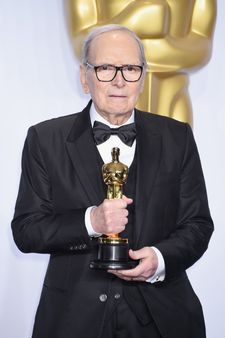In the early Sixties, the western, with a few exceptions, had become sentimental and always glossed over the brutality of casual gun use. Victims just fell over dead without a mark on them, saying: “They got me!”. Suddenly, over the hill came a whole new style of dry, dusty, terrible. blood-soaked truth about the west. Although it was by no means the first, The Good, the Bad and The Ugly was one of a string of hard headed films labelled “Spaghetti Western” that were produced in southern Europe by, among others, Italian cinema royalty, Sergio Leone.
The casting of dust-chewing Clint Eastwood, the enigmatic but deadly Lee van Cleef and dirty, greasy Eli Wallach gave the pleasing but immoral power of the anti-hero to these films. Hollywood sneered but the audiences liked them and time has shown them to be classics, the music, maybe even more so.
The absence of the grand landscape of the American west, familiar in so many other horse operas, allows the film to focus on character and plot. The complex story of treachery and greed dominates every turn and the scenery, although vital is secondary.
 |
| Ennio Morricone with his Oscar for The Hateful Eight Photo: ©A.M.P.A.S.® |
I still get a frisson when I hear the main theme with its strained, ahhing voices, the plaintive whistling and guitar “twang” of Alessandro Alessandroni. Read what you will into the fact that Morricone, Leone and Allesandroni were at school together but the resulting brew gives us this landmark piece of music that lights up the eyes of most people of a certain age.
The main piece of the soundtrack, in its time, was unusual and definitely not your standard tune. The soundtrack includes punctuating returns of the main theme’s musical motifs to great effect – check out the cigar puff in the first hanging scene. Unusual chanting passages, the use of the jaw harp and wonderful trumpet arpeggios abound. The mood is always set by some musical element, be it harmonica, voice, guitar or brass. The desert wind, cicadas and the mission bell, play their part but silence is also key to the film’s suspense. The final three-minute shootout scene, classic, tense, nervy and long is kept so by the build up of the trumpet-blast music and a flurry of cuts between the protagonists until they draw, then the gunfire is the music followed by silence.
The film ends with the music’s character motifs underlining the written titles of each protagonist, deftly and completely breaking the standard end title format. So satisfying.
Prolific and energetic, Morricone went on to produce the scores for more than 70 films, including Cinema Paradiso, The Mission and The Hateful Eight. More than this, he has collaborated with many other artists and sold a quite incredible number of records.
The soundtrack to The Good, the Bad and the Ugly remained in the album charts for a year, a true measure of how popular and cool, it was at the time. It was played incessantly on the radio. It was like nothing we’d heard before and expanded the folk appreciation of other musical forms. Without Morricone’s skill and energy as a composer, we would be so much the poorer. And it’s so listenable, even in 2020.
The film is available to watch, from £2.49 at GooglePlay or YouTube among other platforms. Read more abou Morricone on his own website and for more on the subject of Spaghetti Westerns, read Alex Cox's book Lots of great info on Morricone on his own website at http://www.enniomorricone.org/ The film’s IMDB reference: https://www.imdb.com/title/tt0060196/ Find out more on Spaghetti Westerns at: https://en.wikipedia.org/wiki/Spaghetti_Western or read Alex Cox’s book on the subject, 10,000 Ways To Die, available from Amazon





















